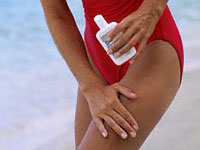Experts warn: don't trust labels on sun creams
Like a lot of blond-haired, fair-skinned people, 34-year-old Jonjon Baus slathers on sunscreen before he heads outdoors. As a bicyclist and runner, he opts for the sweatproof formulas, and because he rarely gets sunburned, he figures he's safe.

"That's really how I gauge how effective my sun protection is," says Baus, a manager for Track Shack, an Orlando, Fla., running store.
But in the wake of a class action lawsuit filed recently in California against sunscreen manufacturers - claiming they have fraudulently exaggerated the effectiveness of their products - Baus has started to wonder.
In fact, although dermatologists still recommend the liberal use of sunscreen, they warn that it's entirely possible for the sun to damage skin without burning it, and that most of the sunscreens currently on the market do a better job preventing sunburn than they do at preventing other problems - including premature wrinkles, age spots and even skin cancer, reports Myrtle Beach Sun News.
According to Independent, people may be risking skin cancer because of confusing or inaccurate information on sun lotions. The European Commission said labelling guidelines should be reviewed and called on sunscreen makers to avoid vague or misleading advice, or face the prospect of new, legally binding rules.
Among the labels judged unacceptable are those that give the impression of total protection - such as "sunblocker" or "total protection" - and those that use unclear or imprecise terminology such as "broad spectrum", "strengthened protection UVA" and "100 per cent anti-UVA/UVB/IR".
The commission suggests four new categories of product - low, medium, high, and very high protection - which would have to satisfy specific criteria.
For this summer, the European Commission recommends:
Avoiding too much sun exposure at peak hours
Wearing protective clothing
Keeping babies and children out of direct sunlight
It underlines that 90% of ultraviolet radiation can penetrate clouds, and that half a metre under water it will still be 40% as intense as at the surface.
The Commission launched a period of consultation on Thursday, which will end in mid-June.
It will then issue a non-binding recommendation to industry.
An estimated 1.3bn euro (£900m) of sunscreen products were sold in Europe in 2004.
Seven of the top 10 suppliers are European, with a joint market share of 88%., reports BBC News.
O.Ch.Subscribe to Pravda.Ru Telegram channel, Facebook, RSS!


